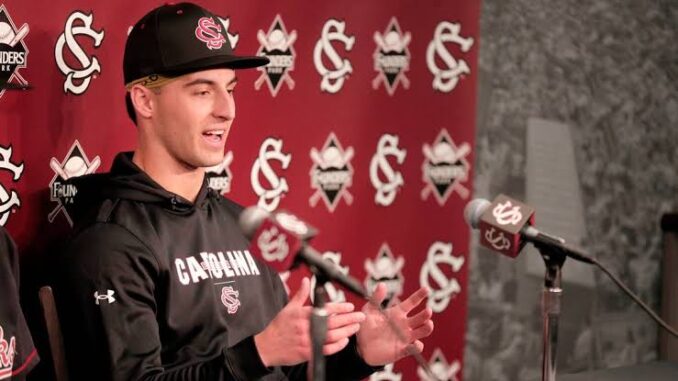
Roman Kimball Announces Departure from South Carolina Gamecocks Baseball: Another Significant Setback for the Team
In a move that has sent shockwaves through the college baseball community, Roman Kimball has officially announced his departure from the South Carolina Gamecocks baseball team. The news comes as a significant blow to a program already dealing with a series of high-profile exits and internal challenges. As fans, teammates, and coaching staff digest the implications of Kimball’s exit, it’s becoming increasingly clear that this is more than just the loss of a talented player—it is a symptom of deeper issues within the program.
Roman Kimball: A Rising Star
Roman Kimball came to South Carolina with high expectations and an impressive resume. Originally from New York and a standout at P27 Academy in Lexington, SC, Kimball was ranked among the top high school pitchers in the country. Before joining the Gamecocks, he began his collegiate career at Notre Dame, where he showed flashes of brilliance. Though his time there was marred by injuries, Kimball’s talent was undeniable.
When he transferred to South Carolina, it was seen as a major coup for the Gamecocks—a team with a rich baseball tradition and a passionate fan base. Kimball’s fiery fastball, competitive edge, and leadership potential made him one of the most anticipated additions to the roster. In a program seeking to reestablish its dominance in the SEC, Kimball symbolized both hope and renewal.
The Impact of His Departure
Losing Roman Kimball is not just about statistics, although those are certainly impressive when he is healthy. It’s about losing a cornerstone of what was expected to be the next phase of South Carolina baseball’s resurgence.
His absence creates a massive gap in the Gamecocks’ pitching rotation. With several other players having already declared for the MLB draft or entered the transfer portal, Kimball’s exit compounds an already difficult situation. South Carolina is now staring down the barrel of a season without some of its top arms—an issue that will no doubt put pressure on the incoming recruiting class and coaching staff.
More importantly, Kimball was viewed as a cultural leader within the clubhouse. His energy, discipline, and relentless work ethic set a standard for younger players. Losing that type of figure is hard to quantify in terms of wins and losses, but make no mistake—it is deeply felt.
A Pattern of Exodus
Kimball’s decision to leave is not occurring in a vacuum. Over the past few months, the Gamecocks have experienced a worrying trend of key players opting out, transferring, or declaring prematurely for the draft. Some analysts have pointed to internal friction within the coaching staff, while others cite the increasingly competitive landscape of NIL deals and transfer opportunities in college baseball.
Whatever the cause, the results are the same: South Carolina is bleeding talent. For a program that once stood among the elite, including back-to-back national championships in 2010 and 2011, this exodus threatens to derail years of careful recruiting and development.
What’s Next for Roman Kimball?
As of the time of this announcement, Roman Kimball has not publicly declared his next destination. Speculation ranges from another SEC powerhouse to a professional opportunity, particularly given his previous injury history and the urgency to make the most of his remaining eligibility.
Regardless of where he ends up, there’s no denying that Kimball’s skills will be a major asset to his next team. His fastball velocity, combined with his improved command and secondary pitches, make him a dangerous weapon on the mound. More than that, his mental toughness—honed through recovery from injuries and adapting to different team environments—makes him a resilient and mature player.
If he stays in college baseball, expect multiple top-tier programs to express interest. If he opts for the professional route, he will need to showcase his health and consistency to scouts, but the potential is clearly there.
The Message This Sends
Kimball’s departure sends a clear and unsettling message: something is not working within the South Carolina Gamecocks baseball system. Whether it’s dissatisfaction with coaching decisions, lack of competitive vision, or other off-field factors, high-level players are making the choice to leave rather than stay and build something lasting.

This trend can become self-fulfilling. Once a few talented players leave, others may start to question the program’s direction and whether it’s the right place for them to achieve their personal and professional goals. The Gamecocks are now at a crossroads. Either leadership addresses these internal issues head-on, or they risk sliding further down the SEC pecking order.
Fan Reaction and the Bigger Picture
The reaction among Gamecock fans has been one of disappointment mixed with frustration. Many had hoped that the team’s recruitment efforts and recent additions would usher in a new era of success. Instead, the program finds itself dealing with instability and the loss of another key figure.
Social media has been flooded with speculation, anger, and a few messages of support for Kimball himself. While fans wish him the best, they’re understandably concerned about the future of a program that appears to be unraveling just when it was supposed to be surging forward.
In the bigger picture, Kimball’s decision may reflect broader changes in the world of college sports. The transfer portal has given players more freedom than ever, and with NIL deals influencing decisions, the traditional model of building a program over several years is quickly becoming obsolete. Programs must now be agile, transparent, and extremely competitive—not just on the field, but in the overall experience they offer their athletes.
Where Do the Gamecocks Go From Here?
The onus now falls on head coach Mark Kingston and the South Carolina athletic department to stem the tide. Whether that involves reshuffling the coaching staff, reimagining the team culture, or simply being more aggressive in the transfer market, something has to give.
With SEC rivals like LSU, Florida, and Vanderbilt continuously reloading with elite talent and top-tier facilities, South Carolina must find a way to compete—not just in games, but in player retention, development, and recruitment. The departure of someone like Roman Kimball is not just a setback. It’s a wake-up call.
Final Thoughts
Roman Kimball’s exit from the South Carolina Gamecocks is a significant and symbolic moment for the program. It marks the loss of a premier talent, a clubhouse leader, and a player who represented what could have been a turning point for the team.
For Kimball, the future likely holds more opportunities and a chance to shine on a bigger stage. For South Carolina, however, the path forward looks uncertain. Without swift and meaningful change, this departure could be just one of many on the horizon.
In the competitive world of SEC baseball, nothing stays still for long. And unless the Gamecocks act decisively, they risk being left behind in a conference that never stops evolving.
Leave a Reply